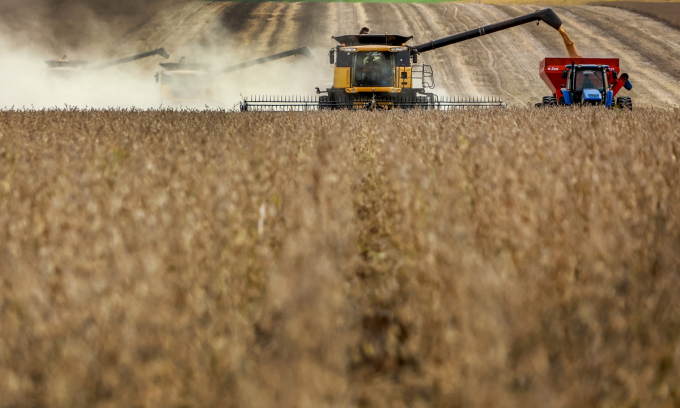November 28, 2025 | 02:26 GMT +7
November 28, 2025 | 02:26 GMT +7
Hotline: 0913.378.918
November 28, 2025 | 02:26 GMT +7
Hotline: 0913.378.918

Sky-high grain prices on global markets are helping to alleviate a challenging monetary and fiscal situation in Argentina, which is poised to receive big windfall revenues this year from its farm exports. Although the country’s 2020-2021 grain harvest is expected to be lower than the previous one in terms of volume, the country is benefiting from a multi-year high in grain prices, which have moved upward steadily since last July. Photo: Laprensalatina
New records were set on futures markets as the rise in wheat prices picked up pace over the past week and milling premiums topped £50/t in some regions.
Old-crop has seen the biggest rises, with London’s May 2022 feed wheat contract at close to £245/t delivered on Wednesday 24 November. This was a rise of almost £17/t on the week.
Midweek, ex-farm values for December movement of feed wheat ranged from £221/t to £242/t, compared with £208-£232/t a week earlier. Full-spec milling wheat was quoted in a range from £268/t to £280/t, up on average by just over £16/t on the week.
Milling wheat premiums have jumped again as millers struggle to get hold of supplies on several fronts, having started the current crop year with little stock.
First, haulage is still at a premium. Second, their normal sources of imports to the UK are more expensive. Third, in addition to the crop damage done by Canada’s summer heat dome, the recent floods in that country have brought transport networks to a halt in some regions, so grain cannot be moved to the ports.
At grower co-op Openfield, head of grain marketing Glenn Mason said every day brought a different challenge.
“We’re in a very volatile market – aside from the fundamentals, investors are using commodities as a hedge against inflation. There are no bearish drivers.”
Mr Mason said millers were using as much home-grown grain as they could, with decent premiums for material that did not make full spec.
“The biggest issue is the imported alternatives are more expensive than the domestic equivalent,” he said.
“There is nothing cheaper available, so they are having to be a bit more flexible than normal and are very adept.”
The threat of Russian wheat export taxes rising in the new year and a new export quota has added to the general firmness in the market.
The dramatic rise in prices over the past three months has meant that growers who can afford to do so have held back from selling, exacerbating the supply issues.
While a big Australian wheat crop is expected, concerns are being voiced over its quality and protein content, in particular.
Wheat is also supported by relatively strong demand for US ethanol, which uses just over one-third of the US maize crop.
The AHDB’s Early Bird Survey of plantings and planting intentions for 2022 puts the wheat area at 1.81m hectares, which is higher than the 10-year average.
Barley, forecast at 1.1m hectares, is slightly down on the 2021 area, with a further swing back towards winter barley, said AHDB Cereals and Oilseeds.
It cautioned that the expected drop in the spring barley area may not be as great as initially thought, as high grain prices and the lower fertiliser requirements of the spring crop may see a larger area planted than initially intended.
Strong global demand for wheat; tight and declining stocks in exporter countries
EU is exporting wheat at a fast pace – about 30% ahead of last year to date on official data, which is understated as it is missing some declarations for French shipments
Canadian crop damaged and reduced by heat dome; now floods are preventing movement to ports
Possible rise in Russian export taxes and a new quota in 2022
Massive Chinese buying in first 10 months of 2021 – wheat imports of 8.1m tonnes (6.7m tonnes in the same period last year), barley 9.9m tonnes (6m tonnes in 2020) and maize 26.3m tonnes (7.8m tonnes last year)
(Fwi.co.uk)

(VAN) A new study reveals how the simultaneous effects of ocean acidification, salinity and loss of oxygen are making the world more fragile.

(VAN) Hopes are growing that the creation of the first 3D turkey gut model could be a turning point in the battle against the virulent blackhead disease.

(VAN) Tyson, America’s biggest meat supplier, plans to shutter one of its largest beef processing plants as the industry continues to struggle with low cattle supplies and political pressure from Washington.

(VAN) New FAO study shows how digital solutions are empowering farmers and fishers to prevent losses and build resilient agrifood systems.

(VAN) Brazil's COP30 presidency pushed through a compromise climate deal on Saturday that would boost finance for poor nations coping with global warming but that omitted any mention of the fossil fuels driving it.

(VAN) Poultry farmers in the UK have been warned that they could face one of the worst winters yet for bird flu.

(VAN) Prices of main-crop paddy have risen sharply, with jasmine rice hitting 16,100 baht per tonne — the highest level in years.